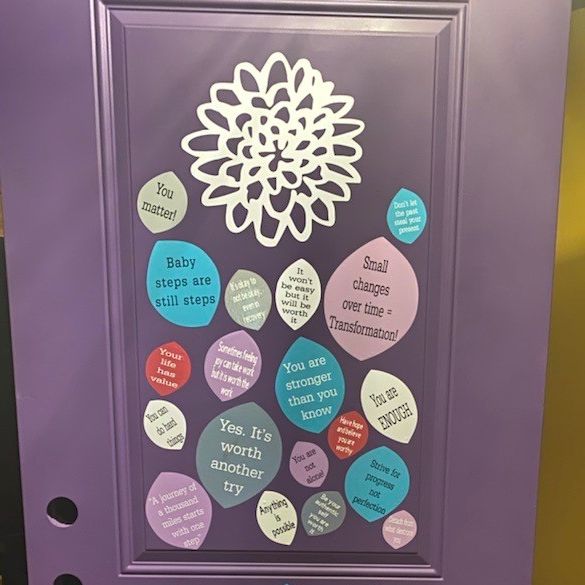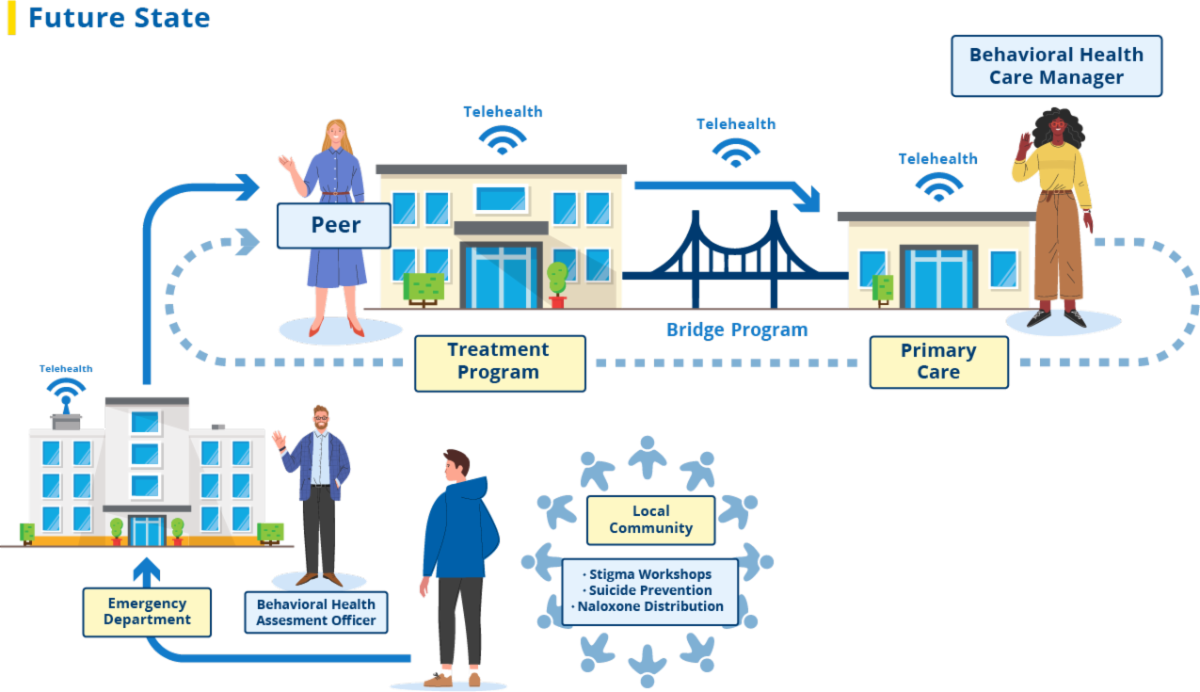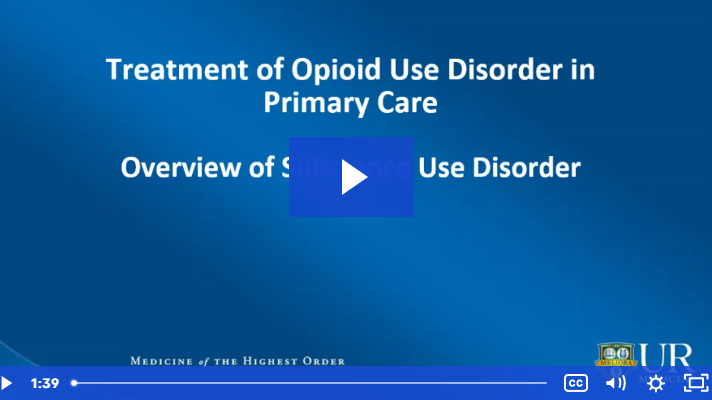UR Medicine Recovery Center of Excellence newsletter | |
Supporting rural communities as they write
a new chapter in the effort to overcome the overdose crisis.
| |
|
Chapter Five
Community Collaboration Shapes
New Practices
| |
|
This summer, we complete the third year of our Health Resources and Services Administration (HRSA) grant and look ahead to a fourth. We invite you to explore the 13 best practices we have disseminated so far—and hope you will share your feedback with us!
Your knowledge, expertise, experience, and perspectives inform our collective efforts to reduce morbidity and mortality related to substance use disorder (SUD).
We are grateful to our expanding circle of collaborators in rural communities who have partnered with us to develop and disseminate resources and implement programs. We look forward to learning how we can better respond to your community’s needs!
We stand by to answer questions and provide hands-on implementation support through Program Assistance.
| |
Revisit National Health Equity and Stigma Summit | |
|
If you missed our Taking Action Summit, held May 18-20 at the Eastman School of Music in Rochester, NY, please visit our website for a recap, video recordings, and other materials. Speakers at the hybrid in-person and virtual conference included people with lived experience of SUD, providers, researchers, policymakers, health equity experts, advocates, and authors. Participants engaged in candid discussions of stigma and health equity related to SUD, grew their network of similarly committed colleagues, and shared strategies and solutions.
Among other activities, the summit included a “Door to Recovery” project in which participants contributed positive statements about recovery that were printed and attached to a purple door. This door will soon be installed in a recovery community. If you would like to submit a note to be added, please email us!
|  | The summit engaged hundreds of people across the U.S., with nearly 500 users logged in to the virtual platform and over 170 in-person attendees. We hope its impact reaches many more and inspires action. | |
|
As presenters from the Office of National Drug Control Policy discussed at the Taking Action Summit, harm reduction is a critical component of the federal government’s new National Drug Control Strategy. It is also a priority area in the Department of Health and Human Services’ Overdose Prevention Strategy, along with prevention, evidence-based treatment, and recovery support. In addition to our webpage on providing naloxone in rural communities, in recent months we have published additional resource pages focused on harm reduction.
Preventing Overdose from Combined Substances
| |
|
Attention to polysubstance use is urgently needed in response to the evolving overdose crisis. To help rural communities address this challenge, we released a webpage featuring a 15-minute video.
This resource provides a comprehensive overview to equip communities with background information, clinical understanding, and strategies. We also provide an informative one-page tool—Facts for Life: Drug Interaction and Overdose—convenient for sharing and distribution.
| |
Suicide Prevention
To help communities address suicide risks, we partnered with SafeSide Prevention, a suicide-prevention training organization, to adapt their evidence-based framework. A new training module was designed to focus on challenges in rural communities as well as on suicide related to opioid use disorder (OUD).
SafeSide provides comprehensive program-development assistance, video-based education and training, tools, and refreshers to ensure organizations and staff in rural communities can successfully implement the training framework.
| |
 | |
As with other treatable chronic diseases, it is important to have a system in place to help patients with SUD: prevention and screenings, acute care and long-term maintenance treatment, seamless linkages, and ongoing support for patients and their families. In the Appalachian region of New York State, we have taken an Ecosystem of Recovery approach that emphasizes creating broader access to and community-wide support for best practices in SUD treatment. This approach may be a helpful framework for other rural communities.
The Ecosystem includes multiple best practices, links to which can be found in the toolkit on our resource page. These include two recently published programs for primary care settings.
Treatment in Primary Care
To help primary care practices address the needs of patients with SUD, we have developed comprehensive training modules on this topic. Providers and staff can learn through a growing list of cost-free trainings that carry continuing-education credits including:
- Overview of SUD and Primary-Care Based Medications for Opioid Use Disorder (MOUD)
- Integrating SUD Treatment in Primary Care
- Practical Applications for Integrating SUD
- Screening, Brief Intervention and Referral to Treatment (SBIRT)
- SUD and the Growing Hepatitis C Virus Epidemic
|  | |
Behavioral Health Care Managers
We recently released resources that focus on the role of the Behavioral Health Care Manager (BHCM) in rural primary care practices. We have drawn upon best practices and learnings from the comprehensive Collaborative Care Model developed by the University of Washington Advancing Integrated Mental Health Solutions (AIMS) Center and adapted the BHCM role to help rural primary care practices implement it more readily.
| |
Please visit the Q&A with program lead George Nasra, M.D., M.B.A., professor of clinical psychiatry, University of Rochester Medical Center, to learn more about integrating behavioral health and the role of the BHCM. By prioritizing this role and taking a long-term approach in working toward collaborative care, implementation can be more manageable and less of a heavy lift for rural primary care practices. | |
|
HRSA has extended funding for the UR Medicine Recovery Center of Excellence for another year, through August 2023. Along with ongoing initiatives, our work will include new projects in the following areas:
- pain management
- promoting health equity
- reducing stigma
- suicide prevention
- MOUD
- SUD treatment response
| |
Events to Increase Awareness, Inspire Action
-
August 31 is International Overdose Awareness Day: a worldwide campaign to end overdose, remember without stigma those who have died, and acknowledge the grief of the family and friends left behind.
|
|
Looking for more updates? Follow us on social media. | |
|
This HRSA RCORP RCOE program is supported by the Health Resources & Services Administration (HRSA) of the US Department of Health & Human Services (HHS) as part of an award totaling $15.7M with 0% financed with non-governmental sources.
The contents are those of the author(s) and do not necessarily represent the official views of, nor an endorsement by HRSA, HHS or the US Government.
| | | | | |